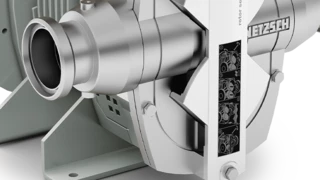NETZSCHicon
Mechanical efficiency
Mechanical efficiency describes the ratio of the mechanical power actually transmitted by the pump to the power absorbed at the shaft. It indicates how efficiently the mechanical energy is utilised within the pump and how much energy is lost due to mechanical losses, such as friction in bearings, seals, or moving components.
Calculation of the mechanical efficiency:
whereby:
- : Hydraulic efficiency [%]
- : Hydraulic power [W]
- : Mechanical power [W]
A high mechanical efficiency indicates little energy lost due to friction or mechanical resistors. Low efficiency, on the other hand, indicates increased wear or inefficient component design.
Factors that influence mechanical efficiency:
- Bearing and seal friction: Mechanical losses due to sliding or rolling bearings and sealing systems
- Choice of materials: High-quality materials reduce friction and wear
- Operating conditions: Speed, temperature, and load affect mechanical efficiency
- Lubrication and maintenance: Regular maintenance minimises friction losses and increases service life





